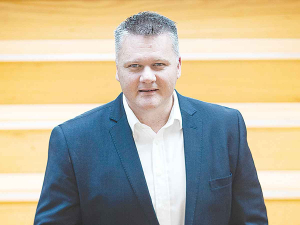Battle for milk
OPINION: Fonterra may be on the verge of selling its consumer business in New Zealand, but the co-operative is not keen on giving any ground to its competitors in the country.
 Fonterra chief executive Miles Hurrell says the co-op will soon set Scope 3 targets which cover indirect emissions from its farm suppliers and account for more than 90% of its tally.
Fonterra chief executive Miles Hurrell says the co-op will soon set Scope 3 targets which cover indirect emissions from its farm suppliers and account for more than 90% of its tally.
Fonterra will shortly be introducing a Scope 3 emissions target, which will seek to reduce emissions intensity on supplying farms.
Chief executive Miles Hurrell told the International Dairy Federation's world dairy summit in Chicago last month, working with farmers to collectively achieve this goal is imperative for the co-op.
"We already provide farmers with insights reports which detail their individual farm's greenhouse gas emissions," he says. "By knowing where their emissions come from, farmers can see where they need to take action on farm."
Fonterra's plan to introduce a Scope 3 emissions target was first announced at its annual general meeting one year ago.
The co-op had initially planned to release the target around June. However, the co-op delayed it by six months after pushback from farmer shareholders, already under pressure from rising interest rates, soaring farm input costs and lower farmgate milk price.
Fonterra claims it is facing pressure from overseas markets, big customers and banks to improve sustainability. While the co-operative has been reducing its Scope 1 and 2 emissions, generated primarily by its manufacturing sites and transport operations, it hasn't yet set a target for Scope 3. These cover indirect emissions from its farm suppliers and account for more than 90% of its tally.
Fonterra claims New Zealand's pasture-based farming model produces low carbon dairy with a footprint one third the global average. Hurrell points out that despite this natural advantage, they're always looking to improve, so that the co-op can continue to meet the needs of customers, regulators, and financial institutions.
"But we also know that finding a solution to methane will be a huge unlock for our farmers' emissions profiles. Agriculture makes up almost half of the New Zealand's domestic greenhouse gas footprint, so we know as an industry and a country we must find a solution."
Hurrell says any methane solution must do four things - it must be good for the cow, good for the milk, good for farmers, and of course good for the planet.
He adds that it is no easy task, but the co-op can achieve more through partnering with others. One of these partnerships is between New Zealand agri-industry and Government, in a Joint Venture called AgriZeroNZ. Over the next three years around $165 million has been committed to accelerate the development of emission mitigation tools and technology through targeted emissions.
The World Wide Sires National All Day Breeds Best Youth Camp Best All Rounder plaudit has become family affair, with 2026 Paramount Cup winner Holly Williams following in her sister Zara's footsteps.
DairyNZ is giving New Zealand farmers a unique opportunity to gain hands-on governance and leadership experience within the dairy sector.
Herd improvement company LIC has posted a 5.2% lift in half-year revenue, thanks to increasing demand for genetics.
According to the latest Fresh Produce Trend Report from United Fresh, 2026 will be a year where fruit and vegetables are shaped by cost pressures, rapid digital adoption, and a renewed focus on wellbeing at home.
The Roar is a highlight of the game hunting calendar in New Zealand, with thousands of hunters set to head for the hills to hunt male stags during March and April.
OPINION: The past few weeks have been tough on farms across the North Island: floods and storms have caused damage and disruption to families and businesses.

OPINION: Meanwhile, red blooded Northland politician Matua Shane Jones has provided one of the most telling quotes of the year…
OPINION: This old mutt has been around for a few years now and it seems these ‘once in 100-year’ weather…